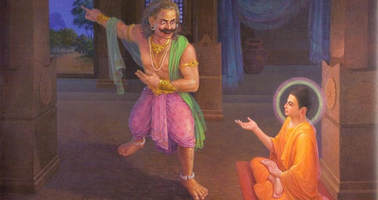 Download Friday Dhamma talk From the Alavaka Sutta... “What’s a person’s best wealth? What brings happiness when practiced well? What’s the sweetest taste of all? The one who they say has the best life: how do they live?” “Faith here is a person’s best wealth. The teaching brings happiness when practiced well. Truth is the sweetest taste of all. The one who they say has the best life lives by wisdom.” “How do you cross the flood? How do you cross the deluge? How do you get over suffering? How do you get purified?” “By faith you cross the flood, and by diligence the deluge. By energy you get past suffering, and you’re purified by wisdom.” “How do you get wisdom? How do you earn wealth? How do you get a good reputation? How do you hold on to friends? When you pass on from this world to the next, how do you not sorrow?” “One who is diligent and discerning gains wisdom by wanting to learn, having faith in the perfected ones, and the teaching for becoming extinguished. Being responsible, acting appropriately, and working hard you earn wealth. Truthfulness wins you a good reputation. You hold on to friends by giving. When you pass on from this world to the next, that’s how you do not sorrow. A faithful householder who has these four qualities does not sorrow after death: truth, principle, steadfastness, and generosity.  Download the Friday talk here. At Savatthi. There the Blessed One said: "From an inconstruable beginning comes transmigration. A beginning point is not evident, though beings hindered by ignorance and fettered by craving are transmigrating & wandering on. What do you think, monks: Which is greater, the tears you have shed while transmigrating & wandering this long, long time — crying & weeping from being joined with what is displeasing, being separated from what is pleasing — or the water in the four great oceans?" "As we understand the Dhamma taught to us by the Blessed One, this is the greater: the tears we have shed while transmigrating & wandering this long, long time — crying & weeping from being joined with what is displeasing, being separated from what is pleasing — not the water in the four great oceans." "Excellent, monks. Excellent. It is excellent that you thus understand the Dhamma taught by me. "This is the greater: the tears you have shed while transmigrating & wandering this long, long time — crying & weeping from being joined with what is displeasing, being separated from what is pleasing — not the water in the four great oceans. "Long have you (repeatedly) experienced the death of a mother. The tears you have shed over the death of a mother while transmigrating & wandering this long, long time — crying & weeping from being joined with what is displeasing, being separated from what is pleasing — are greater than the water in the four great oceans. "Long have you (repeatedly) experienced the death of a father... the death of a brother... the death of a sister... the death of a son... the death of a daughter... loss with regard to relatives... loss with regard to wealth... loss with regard to disease. The tears you have shed over loss with regard to disease while transmigrating & wandering this long, long time — crying & weeping from being joined with what is displeasing, being separated from what is pleasing — are greater than the water in the four great oceans. "Why is that? From an inconstruable beginning comes transmigration. A beginning point is not evident, though beings hindered by ignorance and fettered by craving are transmigrating & wandering on. Long have you thus experienced stress, experienced pain, experienced loss, swelling the cemeteries — enough to become disenchanted with all fabricated things, enough to become dispassionate, enough to be released." ©1997 Thanissaro Bhikkhu. The text of this page ("Assu Sutta: Tears", by Thanissaro Bhikkhu) is licensed under a Creative Commons Attribution-NonCommercial 4.0 International License. To view a copy of the license, visit http://creativecommons.org/licenses/by-nc/4.0/. Documents linked from this page may be subject to other restrictions. Transcribed from a file provided by the translator. Last revised for Access to Insight on 30 November 2013. How to cite this document (a suggested style): "Assu Sutta: Tears" (SN 15.3), translated from the Pali by Thanissaro Bhikkhu. Access to Insight (Legacy Edition), 30 November 2013, http://www.accesstoinsight.org/tipitaka/sn/sn15/sn15.003.than.html .  Download the talk From AN 3:100 Lump of Salt: "Suppose that a man were to drop a salt crystal into a small amount of water in a cup. What do you think? Would the water in the cup become salty because of the salt crystal, and unfit to drink?" "Yes, lord. Why is that? There being only a small amount of water in the cup, it would become salty because of the salt crystal, and unfit to drink." "Now suppose that a man were to drop a salt crystal into the River Ganges. What do you think? Would the water in the River Ganges become salty because of the salt crystal, and unfit to drink?" "No, lord. Why is that? There being a great mass of water in the River Ganges, it would not become salty because of the salt crystal or unfit to drink." "In the same way, there is the case where a trifling evil deed done by one individual [the first] takes him to hell; and there is the case where the very same sort of trifling deed done by the other individual is experienced in the here & now, and for the most part barely appears for a moment." Read the whole sutta on AccessToInsight.org. 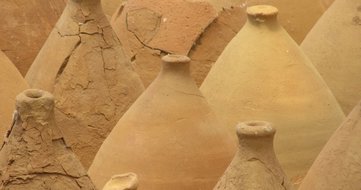 Download the Friday talk "Does not the Blessed One dwell in compassion for all living beings?" "Indeed, headman, the Tathagata does dwell in compassion for all living beings." "Well then, Lord, does not the Blessed One teach Dhamma in full to some, but not so fully to others?" "I will reply to this question, headman, with another. Answer as seems proper to you. What do you think? Suppose a peasant farmer has three fields, one excellent, one middling, and one poor, sandy, salty, with bad soil. Tell me: when the farmer wants to sow his seed, which field would he sow first: the excellent one, the middling one or the poor one that is sandy, salty and with bad soil?" "Lord, the farmer who wanted to sow his seed would sow the excellent field first. Having done that, he would sow the middling field next, and the one that was poor, sandy, salty, with bad soil he might or might not sow. Why? Well it might do for cattle-food."... Read the entire sutta on AccessToInsight. to lean the Buddha's explaination, or Download the Friday talk. 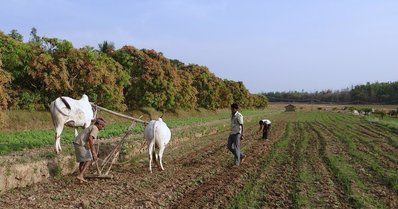 Download the Dhamma Talk While out collecting his morning food, a farmer basically tells the Buddha that if he wants to eat he should grow his own food. The Buddha responds with a deep Dhamma teaching. From SN 7:11 Kasi Bharadvaja the farmer: Thereupon the brahman addressed the Blessed One in a stanza: 1. "You profess to be a plowman, yet your plow we do not see; asked about your plow and the rest, tell us of them that we may know." [The Buddha:] 2. "Faith is my seed, austerity the rain, wisdom my yoke and plow, modesty is the pole, mind the strap, mindfulness is my plowshare and goad. 3. "Controlled in speech and conduct, guarded in deed and speech, abstemious in food,[1] I make truth my weed cutter; arahantship, my deliverance complete. 4. "Exertion, my team in yoke, draws me to Nibbana's security, and on it goes without stopping, wither gone one does not suffer. 5. "Thuswise is this plowing plowed which bears the fruit of Deathlessness; having plowed this plowing one is freed from every ill." Read the whole sutta on AccessToInsight.org  Download the talk From MN 12. Mahāsīhanāda Sutta: The Greater Discourse on the Lion’s Roar “...Sāriputta, there are these five destinations. What are the five? Hell, the animal realm, the realm of ghosts, human beings, and gods. (1) “I understand hell, and the path and way leading to hell. And I also understand how one who has entered this path will, on the dissolution of the body, after death, reappear in a state of deprivation, in an unhappy destination, in perdition, in hell. (2) “I understand the animal realm, and the path and way leading to the animal realm. And I also understand how one who has entered this path will, on the dissolution of the body, after death, reappear in the animal realm. (3) “I understand the realm of ghosts, and the path and way leading to the realm of ghosts. And I also understand how one who has entered this path will, on the dissolution of the body, after death, reappear in the realm of ghosts. (4) “I understand human beings, and the path and way leading to the human world. And I also understand how one who has entered this path will, on the dissolution of the body, after death, reappear among human beings. (5) “I understand the gods, and the path and way leading to the world of the gods. And I also understand how one who has entered this path will, on the dissolution of the body, after death, reappear in a happy destination, in the heavenly world. (6) “I understand Nibbāna, and the path and way leading to Nibbāna. And I also understand how one who has entered this path will, by realising for himself with direct knowledge, here and now enter upon and abide in the deliverance of mind and deliverance by wisdom that are taintless with the destruction of the taints...." To learn more, Download the talk (right click to save) To read the entire sutta, go to Wisdom Publications. 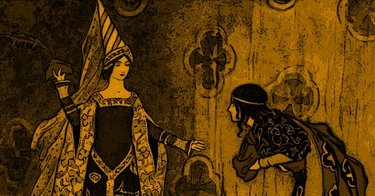 Download the talk On one occasion the Blessed One was dwelling at Sāvatthī, in Jeta's Grove, Anāthapiṇḍika's monastery. Then Queen Mallikā approached the Blessed One, paid homage to him, sat down to one side, and said to him: "Bhante, why is it that some women here are (i) ugly, ill formed, and unsightly; (ii) poor, destitute, and indigent; and (iii) lacking in influence? And why is it that some are (i) ugly, ill formed, and unsightly; but (ii) rich, with great wealth and property; and (iii) influential? And why is it that some women here are (i) beautiful, attractive, and graceful, possessing supreme beauty of complexion; but (ii) poor, destitute, and indigent; and (iii) lacking in influence? And why is it that some are (i) beautiful, attractive, and graceful, possessing supreme beauty of complexion; (ii) rich, with great wealth and property; and (iii) influential?" Want to hear the answers? Download the talk (right click to save) 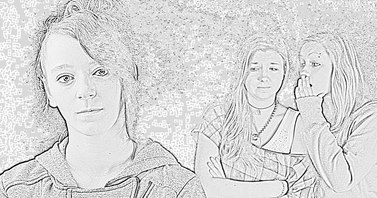 From Numerical Discourses sutta 4:73 Download "A person endowed with these four qualities can be known as 'a person of integrity.' Which four? "There is the case where a person of integrity, when asked, doesn't reveal another person's bad points, to say nothing of when unasked. Furthermore, when asked, when pressed with questions, he is one who speaks of another person's bad points not in full, not in detail, with omissions, holding back... "Then again, a person of integrity, when unasked, reveals another person's good points, to say nothing of when asked. Furthermore, when asked, when pressed with questions, he is one who speaks of another person's good points in full & in detail, without omissions, without holding back... "Then again, a person of integrity, when unasked, reveals his own bad points, to say nothing of when asked. Furthermore, when asked, when pressed with questions, he is one who speaks of his own bad points in full & in detail, without omissions, without holding back... "Then again, a person of integrity, when asked, doesn't reveal his own good points, to say nothing of when unasked. Furthermore, when asked, when pressed with questions, he is one who speaks of his own good points not in full, not in detail, with omissions, holding back... "Monks, a person endowed with these four qualities can be known as 'a person of integrity.'" 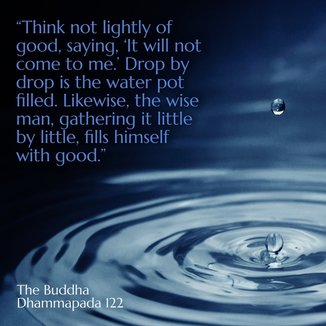 Dhp 122. One should not think lightly of good and say, “It will not come to me.” Even a water-vessel is filled by the falling of one drop after another; Even so a wise man fills himself with good, though he gather it little by little. This religious instruction was given by the Teacher while he was in residence at Jetavana with reference to Treasurer Catfoot, Biḷālapādaka. For once upon a time the residents of Sāvatthi banded themselves together and gave alms to the Congregation of Monks presided over by the Buddha. Now one day the Teacher, in returning thanks, spoke as follows, “Lay disciples, here in this world one man himself gives, but does not urge others to give; in the various places where he is reborn, such a man receives the blessing of wealth but not the blessing of a retinue. A second man does not himself give, but urges others to give; in the various places where he is reborn, such a man receives the blessing of a retinue but not the blessing of wealth. A third man neither himself gives nor urges others to give; in the various places where he is reborn, such a man receives neither the blessing of wealth nor the blessing of a retinue. Lastly, a man both himself gives and urges others to give; in the various places where he is reborn, such a man receives both the blessing of wealth and the blessing of a retinue.” Read what happens next... Or listen to the talk
"pubbeva me, bhikkhave, sambodhā anabhisambuddhassa bodhisattasseva sato etadahosi:
"Before my enlightenment, O monks, while I was still a bodhisatta, it occurred to me: 'ko nu kho loke assādo, ko ādīnavo, kiṃ nissaraṇa'nti? 'What is the gratification in the world, what is the danger in the world, what is the escape from the world?' tassa mayhaṃ, bhikkhave, etadahosi: Then it occurred to me: 'yaṃ kho lokaṃ paṭicca uppajjati sukhaṃ somanassaṃ, ayaṃ loke assādo. 'Whatever pleasure and joy there is in the world, this is the gratification in the world; yaṃ loko anicco dukkho vipariṇāmadhammo, ayaṃ loke ādīnavo. that the world is impermanent, bound up with suffering, and subject to change, this is the danger in the world; yo loke chandarāgavinayo chandarāgappahānaṃ, idaṃ loke nissaraṇa'nti. the removal and abandoning of desire and lust for the world, this is the escape from the world,' yāvakīvañcāhaṃ, bhikkhave, evaṃ lokassa assādañca assādato ādīnavañca ādīnavato nissaraṇañca nissaraṇato yathābhūtaṃ nābbhaññāsiṃ, "So long, monks, as I did not directly know, as they really are, the gratification in the world as gratification, its danger as danger, and the escape from the world as escape, neva tāvāhaṃ, bhikkhave, sadevake loke samārake sabrahmake sassamaṇabrāhmaṇiyā pajāya sadevamanussāya 'anuttaraṃ sammāsambodhiṃ abhisambuddho'ti paccaññāsiṃ. for so long I did not claim to have awakened to the unsurpassed perfect enlightenment in this world with its devas, Māras, and Brahmā, in this population with its ascetics and brahmins, its devas and humans. yato ca khvāhaṃ , bhikkhave, evaṃ lokassa assādañca assādato ādīnavañca ādīnavato nissaraṇañca nissaraṇato yathābhūtaṃ abbhaññāsiṃ, "But when I directly knew all this, athāhaṃ, bhikkhave, sadevake loke samārake sabrahmake sassamaṇabrāhmaṇiyā pajāya sadevamanussāya 'anuttaraṃ sammāsambodhiṃ abhisambuddho'ti paccaññāsiṃ. then I claimed to have awakened to the unsurpassed perfect enlightenment in this world with ... its devas and humans. ñāṇañca pana me dassanaṃ udapādi: 'akuppā me vimutti , ayamantimā jāti, natthi dāni punabbhavo"'ti. paṭhamaṃ. The knowledge and vision arose in me: 'Unshakable is the liberation of my mind; this is my last birth; there is now no more renewed existence.'" © Bhikkhu Bodhi, The Numerical Discourses of the Buddha (Wisdom Publications, 2012) |

|
LocationMahamevnawa Buddhist Monastery Winnipeg at the Buddha Meditation Center Winnipeg 2610 St Mary’s Road, Winnipeg, MB R2N 4A2 204 869 5272 [email protected] We sometimes take photos of our events and post them on our website. If you would like us to take down any images you appear in across any of our platforms, please let us know and we will be happy to remove them. |
Learning
Quick Links
Our Branches
We gratefully recognize that our monastery rests on the traditional territory of Anishinaabeg, Cree, Oji-Cree, Dakota, and Dene peoples, and the homeland of the Métis Nation.
|

 RSS Feed
RSS Feed

